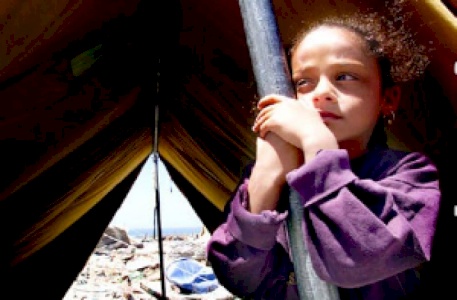Donors Fail to Ante Up, Emergency and Regular Assistance Programs Suffer

“To remain relevant, and to stay on the cutting edge, humanitarian and development organizations … need three things: high quality staff, the right supporting environment and adequate funding. Speaking for my Agency, I can tell you that … for many years now – we have rarely had the third.”
By the end of June 2004, UNRWA had received only 47 percent of its total requirements as set out in its two Emergency Appeals for 2003 and only 27 percent of its total requirements set out in the Emergency Appeal for 2004.
The Agency was again forced to reprogram its emergency assistance in both the West Bank and Gaza, with the primary focus being placed on most critical forms of intervention: food assistance, direct employment and cash assistance. A number of vital projects in primary health, education, infrastructure work and shelter reconstruction and repair were not implemented as a result, producing growing dissatisfaction within the refugee community.
Due to funding shortfalls in the Gaza Strip, the direct hire program offered 819 fewer contracts from April to June than in January to March. UNRWA continues to support 40 percent of nutritional requirements to refugees under this program – a third less than the Agency standard of 60 percent nutritional requirements which UNRWA supplies to those families enrolled in its Special Hardship Case program. At the end of March the remedial assistance program to students in Gaza was also discontinued because of lack of funding.
Facts & Figures – Emergency Assistance in the OPTs
Since UNRWA launched its emergency program in late 2000,
- close to 5 million work days have been generated under the Direct Hire Program;
- six schools, 130 individual classrooms and eight specialist classrooms have been constructed in the Gaza Strip under the Indirect Hire program;
- 434 shelters for Special Hardship Case families identified as priorities for reconstruction were rehabilitated because of their poor condition;
- more than 3.8 million food parcels have been distributed;
- 1,698 tents, 113,427 blankets and 4,604 kitchen kits have been distributed to Palestine refugees in the West Bank and Gaza Strip;
- 12,035 shelters have been repaired across all camps in the West Bank.
Humanitarian Access Continues to Suffer
Israeli incursions into UNRWA installations during the first half of 2004 continued unabated, with the continued harassment of Agency staff and beneficiaries. In Balata refugee camp in the northern West Bank, for example, Israeli soldiers used an UNRWA ambulance as cover during confrontations with residents of the camp. In the past Israel has lodged unsubstantiated claims that armed Palestinians have used UNRWA vehicles.
UNRWA’s Jenin Camp Reconstruction Project was also suspended on two occasions during the period after incidents where staff members came under fire from armed Palestinians. In another incident, the Israeli military requisitioned the UNRWA compound in Tulkarem camp, forcibly detaining about 200 women and children overnight in the building, together with 10 UNRWA staff members.
Between April and June 2004, 80 incidents were recorded in the West Bank where access
was denied, affecting 527 UNRWA staff members. In addition, vehicles were delayed in 253 cases, affecting 1,158 staff members. Two incidents were recorded where staff members were detained at checkpoints. As a result, the Agency lost more than 4,534 working hours. In both the West Bank and Gaza Strip, restrictions on the movement of people and goods continue to hinder UNRWA operations.
“I have already been forced to relocate almost all the Agency’s international staff due to the repeated instances where measures taken by Israeli Authorities have put the lives of my staff at risk. Liaison and coordination are increasingly futile exercises in diplomatic nicety which do not produce reasonable or even rational solutions. Both the freedom of movement of UNRWA’s staff and their safety (for which the Israeli authorities are responsible) need to be respected in full”.
UNRWA Commissioner General Peter Hansen, September
2004
The educational process was particularly affected by the curfews
and closures regime. A total of 150 school days were lost due to
these reasons. In addition, over 2,000 teacher days were lost, i.e.
an average of 20 teachers per day, constituting 1 percent of the
teaching staff and representing a cost of US$50,000 to the Agency.
In addition, 117 instructors’ days were lost at the three
Vocational Training Centres, at a total cost of US$4,446 to the
Agency. Construction of the wall/fence continued to disrupt
education in the villages of Biddo, Qatanneh, Beit Surik, Beit
Inan, and Ramadin.
In late August, the Israeli military barred UNRWA Commissioner
General Peter Hansen and an Under-Secretary from leaving the Gaza
Strip to carry out responsibilities in the West Bank. Additional
restrictions on UNRWA staff were imposed in September, affecting
movement in and out of the West Bank and Gaza Strip.
